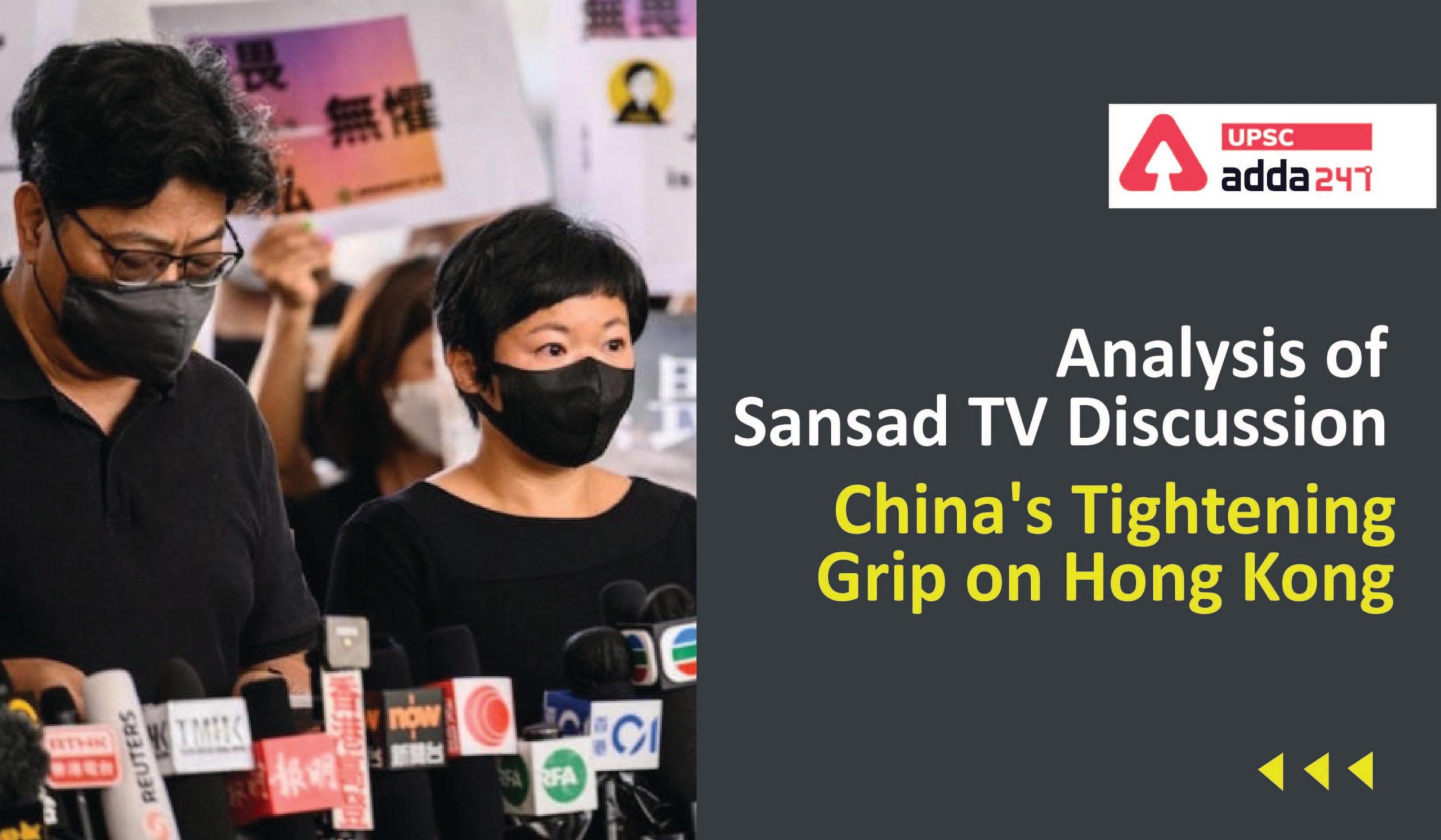Table of Contents
Relevance
”GS 2: India and its Neighbourhood, International Treaties & Agreements”
Context
• The elections for the Legislative Council of Hong Kong which took place in December last year saw pro-China Patriots sweeping the field by winning almost all seats in the Legislative Council.
• G7 and European Union have voiced grave concern over the outcome of Hong Kong’s recent Legislative Council elections, following a similar condemnation by the Five Eyes alliance and Washington’s decision to sanction five Chinese officials for allegedly undermining the city’s semi-autonomous status.
Background
- Hong Kong used to be under British control but was handed back to China in 1997 under a “one country, two systems” principle.
- This was meant to protect certain freedoms for Hong Kong, which no other part of mainland China has: freedom of assembly and speech, an independent judiciary, and some democratic rights.
- These freedoms are enshrined in Hong Kong’s mini-constitution, the Basic Law, which was meant to last until 2047.
- On 11 March 2021, the “patriots governing Hong Kong” resolution was passed at the National People’s Congress (NPC), paving the way for Beijing to amend annexes of the Basic Law.
- On 30 March 2021, the resolution passed the NPC’s Standing Committee and could be enacted in Hong Kong within weeks.
Key Concerns
- 1st July this year will mark the 25th anniversary of Hong Kong’s return to China. In recent years after the handover, China has made a series of official initiatives aimed at enhancing Beijing’s control over Hong Kong.
- China’s Tightening Grip on Hong Kong China is not only tightening its political grip on Hong Kong to rein in the restive city, it’s pushing harder to deepen its influence over the international finance hub’s business life.
- From real estate to initial public offerings, debt issuance and telecommunications, mainland Chinese companies — many of which have government backing — are playing increasingly assertive roles in almost every corner of the city. It’s a shift that has been in progress since the handover in 1997.
- While supporters of greater economic integration point to the growth-boosting impact of Chinese investment in Hong Kong, critics see it as yet another reflection of the city’s diminishing autonomy from the mainland.
- That concern has swelled in recent weeks after China said it would impose contentious national security legislation on Hong Kong, threatening the independence of a judicial system that has been a key draw for international companies and investors.
How is Hong Kong run?
• Hong Kong used to be under British control but was handed back to China in 1997 under a “one country, two systems” principle.
• This means that the city has certain democratic freedoms which no other part of mainland China has.
• This includes the right to elect its own mini-parliament, the Legislative Council (LegCo).
• The LegCo is a powerful body that not only makes and amends Hong Kong’s laws, but also approves budgets and taxes, endorses the appointments of top judges, and can impeach Hong Kong’s head of government, the Chief Executive.
• Its members usually serve four-year terms – though the current term has been extended as elections were postponed by a year due to Covid.
• They were previously elected by the public in various geographical constituencies, as well as interest groups.
What has China done through the ‘patriots governing the Hong Kong’ resolution?
- In March, Beijing passed a “patriots governing Hong Kong” resolution that fundamentally altered LegCo.
- The most important change was that it drastically shrank the proportion of lawmakers who can be directly voted in by the people – from 50% to 22%.
- All candidates must now be vetted by a separate screening committee – which has made it easier to bar anyone deemed as being critical of Beijing.
- The ruling also expanded and gave more powers to the Election Committee – a separate group that heavily skews pro-Beijing.
- Usually, their main role is to choose the Chief Executive, but now, for the first time in years, they also have seats in LegCo.
- The move is a continuation of China’s plan to tighten control over Hong Kong and push for loyalty from all levels of power, following 2019’s huge pro-democracy protests.
- Beijing has also put in place a controversial national security law that has made it easier to punish pro-democracy demonstrators, while Hong Kong authorities have jailed dozens of activists in recent months.
How China is controlling the Hong Kong Economy?
- Hong Kong is likely to develop into a Chinese offshore centre, as a national offshore centre, it may have some tax benefits, leeway in terms of issuing in dollar or attracting dollar investment. But it won’t be a global financial centre, where most of the players are global players.
- While the number of outposts for Japanese or US companies has stayed broadly static over the past five years, the number of mainland Chinese companies with a foot on the ground has soared.
- As mainland Chinese companies are expanding, concern over the city’s future is growing among western companies.
- Over a quarter of companies questioned by the American Chamber of Commerce in Hong Kong this month said they were considering moving elsewhere.
- Nearly 40% of respondents said they were considering relocating personally as China pushes forward with a contentious new national security law that is seen eroding Hong Kong’s legal framework.



 TSPSC Group 1 Question Paper 2024, Downl...
TSPSC Group 1 Question Paper 2024, Downl...
 TSPSC Group 1 Answer key 2024 Out, Downl...
TSPSC Group 1 Answer key 2024 Out, Downl...
 UPSC Prelims 2024 Question Paper, Downlo...
UPSC Prelims 2024 Question Paper, Downlo...
